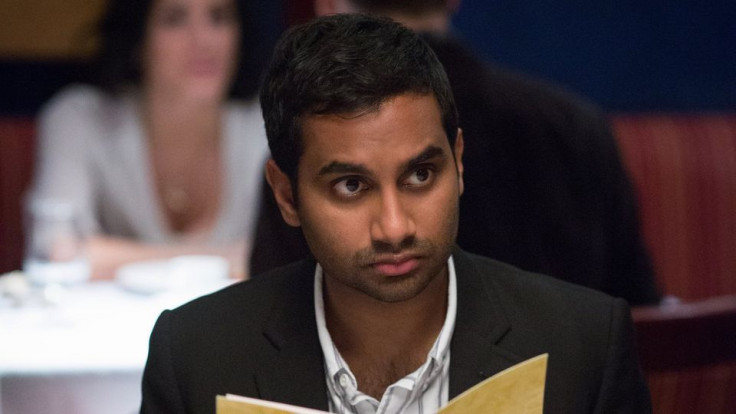'Master Of None' Season 1 Review: What Aziz Ansari's Hilarious Netflix Series Gets Right About Everything We Get Wrong

It's a running joke in the TV world that FX’s “Louie” has essentially become a French New Wave film -- that is, something more than mere comedy, dealing in the profound, the philosophical, the surreal. Aziz Ansari’s fantastic new Netflix series, “Master of None,” which released all 10 episodes of its first season Friday, doesn't hide its equally lofty ambitions -- the opening credits feature a French pop song from 1960s crooner Jacques Dutronc, for crying out loud!
However, comparing “Master of None” to “Louie” would be reductive. As much as Ansari’s Dev wallows “Louie”-style in his quest for love and meaning as a mildly successful New York actor, the character is also filled with a healthy dose of Jerry Seinfeld’s apathy and the unrelenting kindness and optimism that fueled Ansari’s previous TV show, NBC’s “Parks and Recreation.” Those might seem to contradict each other, but true to its title, “Master of None” is a little bit of everything. However, Ansari and co-creator Alan Yang’s writing perfectly balances every element and, besides, in 2015 being “caught in the middle” simply makes the show of its time.
There's no shortage of think-pieces online analyzing (or deriding) the millennial generation, but films and TV series that depict the demographic as anything more than the punchline in the joke of a senior writer’s screenplay are few and far between. However, to write off the shifting sensibilities of a generation defined by the Internet is to dismiss a wave of current and soon-to-be adults bringing their own twist to the eternal adult problems -- dating, sex, kids, race, gender, parents, etc.
“Master of None,” though, gets most things right. In fact, it gets just about everything right. Social media users rushed to compliment the series on its treatment of myriad issues from diversity and race to gender roles to the modern immigrant experience in America, but in the broadest sense possible, the show simply nails the nuances of a time when everyone is in a constant state of mini crisis.
Aziz Ansari carved out a niche in standup comedy -- a niche that made him a superstar -- overanalyzing the seemingly banal, like the rabbit hole of subtext in a simple text chat with a girlfriend or boyfriend. In “Master of None,” Ansari’s gift for savvy and subtle observational humor is given the scope of an entire generation of millennials for whom the Information Age delivers endless information but few answers.
Watch the trailer for "Master of None" below:
The Netflix series captures this in its very first scene, when a condom breaks while Dev (Ansari) and future-girlfriend-current-one-night-stand Rachel (Noël Wells) are having sex, soon enough to not panic but late enough to be concerned. The two 30-somethings scan their phones, their faces distinctly lit by the LED displays, for a conclusive answer on the potential for pre-ejaculate to result in pregnancy.
The easy read here is some cliché commentary on the isolation of the lovers in a tech-dominated world, but the real point of the scene is that both forays into the worldwide web produce contrasting answers to the couple’s question. In that way they are not isolated, but in it together -- it being the daunting task of being a responsible adult. They ultimately decide to play it safe and buy the Plan-B pill – giving the brilliant pilot its title -- but the show’s prevailing theme of anxiety about the future in the face of misinformation and mixed signals lingers. Later, Dev’s friend Kyle (David Charles Ebert) gives contrasting monologues on, first, the joys of fatherhood and, later, the pitfalls of having a family, leaving Dev painfully undecided on what to think about his own family future.
The show also flaunts a unique take on diversity and the political correctness zeitgeist. When Dev wants to find a woman to accompany a young girl he is babysitting into the bathroom, he skips over a woman with a pixie cut to ask someone who looks like more of a “mom-type,” leading to him eating some serious crow about his own biases. However, it’s Dev’s response that epitomizes the show’s fresh perspective.
“I understand why you are not helping, but I want you to know that in my heart, I meant no offense to either of you” says Dev.
Again, the show does not take a side, landing somewhere in the middle where intentions and reality do not always add up and even the most rational thought processes can be muddied by bias and misinformation. Dev does not blame the women for their anger. He knows his comments were just another misstep in trying to make sense of an ever-more-complicated world. Watching Dev try to make sense of that world is the engine that drives the show -- the tagline, after all, is “[Dev] has a lot of questions.”
Oh, and then there’s the fact that “Master of None” is just flat-out funny. While “Louie” often mines the depths of black comedy for cringe-worthy laughs, “Master of None” takes a lighter approach in its pursuit of the profound. When Dev tells Rachel that the Plan-B pill -- and two Marinelli’s apple juices -- is “his treat,” it is a genuine gesture. The laughs come from the context of his kindness; from irony not sarcasm.
Sarcasm, after all, is rampant today, as Internet trolls lampoon any attempt at sincerity and memes reduce complicated social problems to punchlines. “Master of None” shows how when you try to figure out how you really feel about the world, sometimes all that information just gets in the way. That makes the Netflix series a pretty decent blueprint on how to answer life's big questions ... and laugh at yourself along the way.
© Copyright IBTimes 2024. All rights reserved.






















